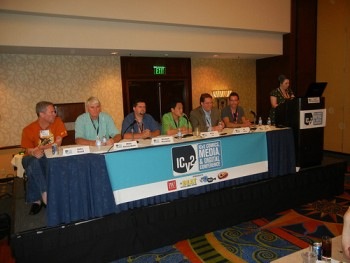Yesterday’s ICv2 Conference on Comics, Media, and Digital kicked off Comic-Con with a look at the business side of things. Over at Publishers Weekly, Calvin Reid and I have a brief recap of some of the stats that Milton Griepp presented at his annual White Paper.
Some quick hits:
GN sales were up 3% so far in 2011 — up more in bookstores, despite the Borders disaster, than in comics shops — while periodical sales were down 8%. The peak of sales for comics and GNs was 2006-2007. Coincidentally that was also a peak year for manga sales, which has declined significantly yet again. But the rate of decline has stabilized.
Overall, he said, it looks like “the worst may be over.”
Griepp mentioned several economic factors at play: the economy in general, event fatigue, price cuts that were only partly effective, changes in management at Marvel and DC that led to uncertainty and distraction; and also a lack of quality product.
For manga, piracy is much more of a concern. Viz is the #1 publisher with Yen #2.
Griepp noted that the bookstore consumer is a different consumer from the Wednesday crowd: “The kind of costumer who shopped at bookstores was a casual consumer, wasn’t as committed, but more influenced by media and press and had some money to spend. They are less involved in the kind of editorial changes that motivate comic shop consumers and comics stores. The good news is there was a lot of them.” This crowd is fueled by their ability to go to a bookstore at any time or go shop on Amazon.
One of the features of the White Paper is a title count showing how the number of books in every genre increased or declined from year to year. Here’s the run down for 2010:
Manga -11%
Genre (superhero) +6
Fiction even
Kids +67%
Humor +10
Other/misc +27
Total +4%
In digital the story was….growing. Duh. He estimated sales had doubled from 2009 in 2010 and are somewhere between $6 and $18 million a year. (Yes, a big span.) Although the growth is clearly spurred by iOS, Android and web sales are coming on strong.
The White Paper was followed by the Agents panel, with Scott Agostoni, ICM co-head of media rights Nick Harris and Circle of Confusion producer Rick Jacobs. Despite being in some sense business rivals, these three were so similar in outlook and demeanor that they were finishing each other’s sentences. As they pointed out, they know all the same people and run in the same circles so they all know each others business. The main takeaway is that it’s harder to get a deal these days — but the deals are bigger when they do come through. Jacobs, the agent for WALKING DEAD, said that was the example of a practically perfect deal, with the creator involved — and loved by AMC — and synergy on all levels.
Whereas in the olden days, just showing a cover was sometimes enough to get an option, now you must show complete script, outlines and more. And of course the upfront money is less as well, especially in TV. It’s all part of the overall tough times in Hollywood, with money tight due to declining revenue streams (DVD sales are way down) and the difficulty of launching new projects.
ComicVine has more on this panel.
Then came the “Transmedia Panel” which I moderated. DC’s John Rood openly joked about Green Lantern, but talked about how the new Android app is an important move for them.
Dark Horse’s Mike Richardson talked about “motion comics v.2” that Dark Horse is developing which will be more expensive but also more dramatic and interesting with actual direction and so on.
Panelfly’s Ed Lang talked about their new business plan which involves an app which will integrate content from ALL different media — although he didn’t go into detail it sounds like a way to search for, say, a Burn Notice comic, and also find all the episodes streaming on Hulu.
IDW’s Ted Adams made some headlines, as always, with actual numbers. IDW’s digital sales have gone from 1% of revenue a year ago to 3% now. Of that, 99% is via app sales — however, IDW does not have a huge web sales presence, as was noted by the next panel’s David Steinberger of comiXology, who said their own web sales are robust.
The final panel was more of a open ended “print to digital” panel with DC’s Bob Wayne, Diamond’s Bill Schanes, GeekChicDaily’s Peter Levin, retailer Joe Field, comiXology’s David Steinberger, and polymath Mark Waid. After a couple of opening questions from moderator Calvin Reid, the questions went to the audience, and the panel turned into another one of those anxious “we don’t know what the hell is going to happen but something is going to happen” panels where people wonder if digital is going to kill their business. This was best expressed by Waid. Steinberger was the star of the show however, noting that comiXology has been the top-grossing book app on iTunes for several weeks now.
Overall, it was an enlightening afternoon, and a good way for people in the business to ease into the scrum of Comic-Con.
Griepp is planning another conference for New York Comic Con, which is sure to include more insights from industry leaders.





